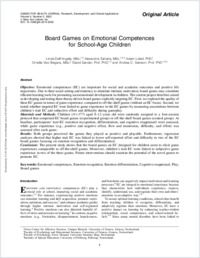Board Games on Emotional Competences for School-Age Children
- Dell'Angela, Linda Swiss Center for Affective Sciences, Campus Biotech, University of Geneva, Geneva, Switzerland.
- Zaharia, Alexandra Swiss Center for Affective Sciences, Campus Biotech, University of Geneva, Geneva, Switzerland & Faculty of Psychology, Swiss Distance University Institute, Brig, Switzerland & Institute of Special Education, University of Fribourg, Fribourg, Switzerland.
- Lobel, Adam Swiss Center for Affective Sciences, Campus Biotech, University of Geneva, Geneva, Switzerland.
- Vico Begara, Ornella Faculty of Psychology and Educational Sciences, University of Geneva, Geneva, Switzerland.
- Sander, David Swiss Center for Affective Sciences, Campus Biotech, University of Geneva, Geneva, Switzerland & Faculty of Psychology and Educational Sciences, University of Geneva, Geneva, Switzerland.
- Samson, Andrea C. Swiss Center for Affective Sciences, Campus Biotech, University of Geneva, Geneva, Switzerland & Faculty of Psychology, Swiss Distance University Institute, Brig, Switzerland & Institute of Special Education, University of Fribourg, Fribourg, Switzerland.
-
2020
Published in:
- Games For Health Journal. - 2020, vol. 9, no. 3, p. 187-196
Emotional competences
Emotion recognition
Emotion differentiation
Cognitive reappraisal
Play
Board games
English
Objective: Emotional competences (EC) are important for social and academic outcomes and positive life trajectories. Due to their social setting and tendency to stimulate intrinsic motivation, board games may constitute efficient learning tools for promoting socioemotional development in children. The current project therefore aimed at developing and testing three theory-driven board games explicitly targeting EC. First, we explored the quality of these EC games in terms of game experience, compared to off-the-shelf games (without an EC focus). Second, we tested whether targeted EC were linked to game experience in the EC games by measuring associations between children’s trait EC and subjective effort and difficulty during gameplay. Materials and Methods: Children (N = 177) aged 8–12 years old were randomly assigned to a four-session protocol that comprised EC board games (experimental group) or off-the-shelf board games (control group). At baseline, participants’ trait EC (emotion recognition, differentiation, and cognitive reappraisal) were assessed, while game experience (e.g., positive and negative affect, flow and immersion, difficulty, and effort) was assessed after each game. Results: Both groups perceived the games they played as positive and playable. Furthermore, regression analyses showed that higher trait EC was linked to lower self-reported effort and difficulty in two of the EC board games focusing on emotion recognition and differentiation. Conclusion: The present study shows that the board games on EC designed for children seem to elicit game experiences comparable to off-the-shelf games. Moreover, children’s trait EC were linked to subjective game experience in two of the three games. Future interventions should examine the potential of the novel games to promote EC.
- Faculty
- Faculté des lettres et des sciences humaines
- Department
- Département de Pédagogie spécialisée
- Language
-
- English
- Classification
- Special education
- License
-
License undefined
- Identifiers
-
- RERO DOC 333151
- DOI 10.1089/g4h.2019.0050
- Persistent URL
- https://folia.unifr.ch/unifr/documents/309514
Statistics
Document views: 187
File downloads:
- Fichier principal: 243
